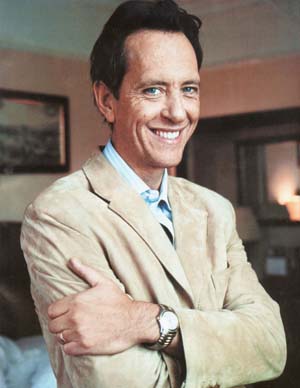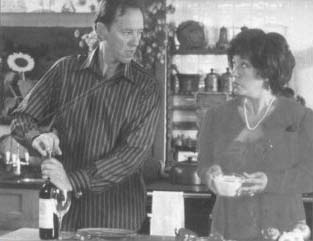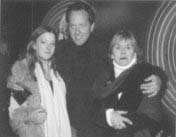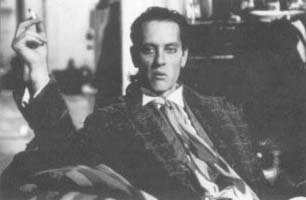The World According To Grant
The Evening Standard Magazine – Friday 17th January, 2003
Brought up by a single father in Swaziland, were acting was considered barely decent, Richard E Grant has always defied convention. Lydia Slater meets the man who married a divorcee eight years his senior, and who is about to play yet another alcoholic.
Richard E. Grant pats the bed next to him invitingly, “Shall we do it here?” he enquires, raising a devilish eyebrow. Then he’s rising to his feet and unzipping his trousers. Seconds later, I’m face to face with his pants.
Fortunately, though, Grant is famously uxorious and has just celebrated his 16th wedding anniversary. It turns out that he just wants to show me the label on the inside of his black, jumbo cord trousers, which are from the very smart Japanese designer Issey Miyake. (He has just been modeling Ermenegildo Zegna suits with such aplomb that I’d asked him if he was keen on clothes, and what labels he wore. Hence the impromptu striptease.)
Dressed in head-to-toe black, the better to offset that saturnine, tanned face and those icy blue eyes, he looks the very definition of the thinking woman’s crumpet. It’s a label that has stuck to him since he shot to fame in 1987 as the self-loathing alcoholic actor Withnail in the cult film Withnail and I. Still, he seems absurdly flattered to be told that, having shared a bed with him in a Richmond hotel for an hour, even for an interview, I will be the envy of my friends.
“Oh, how marvellous, how thrilling for a middle-aged man to hear that,’ he gushes. ‘I can’t tell you, it cheers me up no end.”
Grant, 45, seems in little need of any cheering up. Judging by his hammy behaviour – bouncing around on the bed, bursting into loud song and flinging off his clothes with gay abandon – he is in an ebullient mood.
And it’s not just because he’s about to take off for two weeks in the Caribbean. This year sees the release of Monsieur N, a film about the death of Napoleon in which he has a starring role as the English governor suspected of poisoning his illustrious captive. And tomorrow, he’s appearing in the first episode of Posh Nosh, eight short sketches in which he and comedienne Arabella Weir play a latter-day Johnnie and Fanny Craddock, with Grant as a bibulous, closet gay wine expert. Another Withnail role? “I’ve spent my life playing alcoholics,” says Grant, “I got cast in Withnail playing a drunk and I suppose people believed it.”
The irony is that Grant doesn’t produce the enzyme that processes alcohol, and is consequently unable to drink at all. His first and only bender took place the day before the final rehearsals for Withnail and I, and it took him an entire night to get down a bottle of champagne. “The director asked me to, but I paid the price. I was very, very ill,” he says. “I’d have a drink and be violently sick, but I kept forcing it down so by the next morning I was drunk and then I passed out. I woke up 24 hours later.” In fact, he seems to have spent a lot of time on the Withnail set throwing up. The scene where he drinks a can of lighter fuel was rehearsed with water, but on the day, Grant found himself consuming a mixture of vinegar and Swarfega, with appalling consequences.
Still, it was worth the effort. Since that inspired performance, he has appeared in scores of well-respected films including, The Age of Innocence, The Player and Gosford Park, as well as some rather less successful ones (Hudson Hawk and Jack and Sarah) and the crowd-pleasing Spice World.
He was an ever-present figure on our screens during the festive season. There was his splendidly creepy turn as the archaeologist baddie in The Hound of the Baskervilles, and all those Argos ads, in which he plays a bewigged and rattled rock star blind to the attractions of that useful emporium.
This seems something of a comedown: wasn’t it Withnail himself who was eternally up for a cigar commercial? “There’s only one reason an actor does adverts,” says Grant. But he puts a brave face on it: it’s sales have “gone up something phenomenal” as a result, he says. And it’s given him money to indulge in his passion for collecting. “I’m a maximalist,” he says. His smart Richmond home (five minutes from the hotel where we meet) is apparently stuffed full of ancient toys, memorabilia and artifacts, but you can’t vouch for this because he won’t allow reporters in. Not since somebody made snide comments about the quantity of grains and pulses he had in his kitchen.
In fact, despite the evidence of the impromptu striptease, it’s clear that he is a very private person. He seems to be made acutely uncomfortable by innocuous questions and is forever fending them off by throwing back at you – ‘Well, how have you kept your relationship going?’
As well as being the face for Argos, Grant endorse Ebel watches and wears one on his left wrist. On his right, he sports a humbler watch that is permanently two hours fast – it is set to Swaziland time, where he grew up. “My father gave me this watch before he died,” he explains. “I lost it for a year and my wife gave me one In between, so for practical and sentimental reasons, I wear two.”
Richard E Grant was born Richard Grant Esterhuysen in Mbabane, Swaziland – his name is Hungarian, originally. His father, Hendrick, was minister of education, while his mother, Leonie, worked as a part-time secretary. Grant was the elder of two children, but doesn’t see his younger brother Stuart. They never got on as children – they were chalk and cheese, according to Grant – they last saw each other at their father’s funeral in 1981, when Grant infuriated his conventional brother by, he claims, turning up with bright orange hair. Stuart Esterhuysen, when last heard of, was living in Johannesburg and working as an accountant.
Theirs was a comfortable childhood, with servants and a swimming pool; but there were decedent, White Mischief tensions boiling away underneath. One of the principal forms of entertainment, apart from gossiping, was extra martial affairs. When Grant was 11, his mother ran off to South Africa with a mining engineer, leaving her two sons behind. His father was devastated and Grant found himself having to look after his own parent. At school, he was the only child whose parents were divorced. The other children would tease him by asking where his mother was, and he would cry himself to sleep.
The other reason he was the odd man out at school was his passion for acting. As a child, he made his own puppet theatres and put his own plays on at home, and had no doubts that he wanted to make his living as an actor.
“I didn’t want to be a lawyer or a doctor or a journalist, or any of the limited professions that seemed available. But to say you wanted to be an actor was so preposterous. It was like saying you wanted to be a brothel-keeping child prostitute. It wasn’t considered a proper job. You set yourself up for being pilloried. Swazi was very conservative; it was Fifties in its sensibilities, rather than early seventies.” But he isn’t complaining. “When you’re faced with that sort of disapproval, you either go down, Titanic-like, or it hardens your resolve.”
So Grant defied his peers and went to study drama at Cape Town University. In 1982, after his father’s premature death from cancer, he came to London, where he lived a Withnail-type existence, waiting on tables when he couldn’t get acting work, and almost immediately met his wife-to-be, the well-respected dialect coach Joan Washington, who has coached Kate Winslett, Cate Blanchett, Ralph and Joe Feinnes, Jude Law, Dame Maggie Smith and almost any other actor you could name, when he attended one of her classes at the Actors’ Centre.
She was eight years older and married, with a seven-year-old son. Grant himself had resolved never to marry after the fallout from his parents’ divorce. It was hardly a promising start, yet here they are, 19 years later, apparently as close as ever, and with a 14-year-old daughter Olivia. “I think its just luck, as much as anything,” is his prosaic explanation. “It’s just finding someone you are genuinely compatible with. But I don’t have a smug I’m-all-right-Jack attitude.”
This martial fidelity is all the more admirable given Grant’s unstable profession. It can’t be easy for his wife, having to watch her husband snogging glamorous members of the opposite sex, even in the course of duty.
Grant roars with laughter, “She’s probably just relieved: ‘Thank God he’s out of the house!’ Actually, I do think the ‘Absence makes the heart grow fonder’ cliche applies. You go away, or she goes away, so you do have breaks from each other and that’s probably important.”
He’s also a romantic and even now likes to surprise his wife with impromptu bouquets, although he squirms when this is brought up. “It sounds nauseating, but I like doing it”he confirms. That’s not to say they don’t have rows. “I never believe anyone who says they don’t have arguments or fights,” says Grant.
A friend, who works at the BBC, once telephoned the house to ask whether Washington would be able to coach an actor; the phone was picked up by Grant who announced immediately, “My wife has terrible PMT and can’t possibly speak to you now.”
“They must have been having a terrible row,” says my friend, “but it didn’t make me think well of him. I mean, how humiliating for her.”
There have been rumours that all is not well in the Grant household, but when you put this to him he roars with laughter again. “She’s at home with flu,” he says. “D’you want to come and check?”
Grant freely admits he is not easy to live with: when he was invited on to Celebrity Big Brother, a programme he watched with fascination, his wife told him he was so intolerant that he’d be thrown off immediately.
Intolerant of what? “People wheezing, their eating habits, all sorts of stuff. Oh Christ, they’d have lynched me.”
His odd eating habits would doubtless have drawn the nation’s ridicule; he last tasted coffee in 1972 and found it “revolting” and is almost comical in his dislike of all dairy products.
“Euchhh! Dairy is disgusting. I’ve tried all of it and all of it is repellent. Cream, chocolate, cheese – awful. It’s mucus-tasting.”
Grant says he never considered going on the programme “for a single minute. It would be a death sentence to go on,” he confirms. “And you simply can’t win.”
“I think the very nature of any kind of fame instinctively annoys people. They say the most extraordinary things to you. A woman came up to me in a supermarket and said, ‘Are you Richard E Grant? I don’t like you.’ I was just so taken aback. I thought she’d come to ask where the gravy granules were.”
Grant stars in Posh Nosh, which starts tomorrow (BBC2, 9.50pm).
* NOTE: Programme has obviously been rescheduled since interview and is due to be shown on Wednesday 5th February, BBC 9.50pm.

REG looking dapper in a hotel room in Surrey.

Grant (with yet another bottle of wine he can’t drink)
in his new series Posh Nosh, with Arabella Weir.

With daughter Olivia and wife Joan Washington
at last month’s premiere of Chicago.

As the alcoholic Withnail, his breakthrough role.




